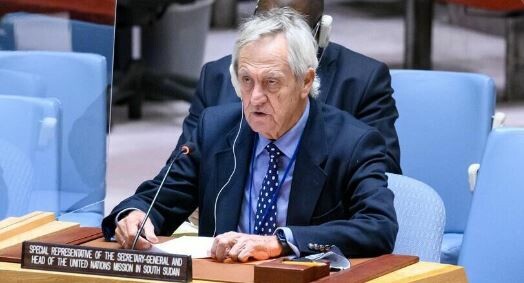South Sudan is not yet ready to hold credible elections in 2024, Nicholas Haysom, Special Representative of the Secretary-General and Head of the United Nations Mission in South Sudan (UNMISS), said on Thursday as the Security Council examined the recent developments in the country, including implementation of the 2018 peace agreement and the dire humanitarian situation exacerbated by the influx of people fleeing the conflict in Sudan.
Briefing the 15-nation organ, Haysom said that with only 11 months remaining, the pace of overall implementation of the Revitalized Peace Agreement towards the December 2024 elections has been uneven. The transitional security arrangements are significantly behind schedule, and the permanent constitution-making process is now 15 months behind the timeline set out in the road map and the peace agreement.
“As matters stand, the country is not yet in a position to hold credible elections, a view shared by key stakeholders across the political spectrum,” he said, stressing that a critical mass of prerequisites must be in place by April 2024 if credible and peaceful elections are to be conducted by December 2024.
He added that the necessary conditions that must be met include: a new permanent constitutional framework in place; properly trained and equipped unified forces deployed; an operational election security plan formulated; a clear electoral framework agreed upon; electoral institutions and mechanisms in place; and voter registration modalities and electoral dispute resolution mechanisms agreed through consensus.
Also briefing the Council was Michel Xavier Biang (Gabon), Chair of the Security Council Committee established pursuant to resolution 2206 (2015) concerning South Sudan, who reported on the Committee’s work in 2023. During a visit in October, the Chair and his delegation met with South Sudan Government and Parliament officials, UNMISS leadership, the UN country team, diplomatic corps, and civil society representatives.
He said that the discussions focused on the arms embargo and the implementation of the key benchmarks established by resolution 2577 (2021), as well as progress in the implementation of the Revitalized Peace Agreement. Since January 2023, the Committee has received four exemption requests concerning the travel ban and asset freeze measures, three of which were granted, he added.
In the ensuing debate, delegates welcomed a series of strides South Sudan made on the political front, including the enactment of electoral laws and restructuring of State institutions, but echoed the concern expressed by the Special Representative about delays in the implementation of the peace agreement and preparations for elections. Many speakers also highlighted the need to address acute humanitarian conditions.




